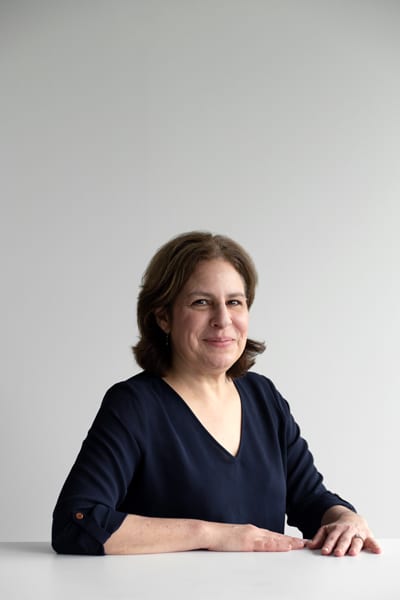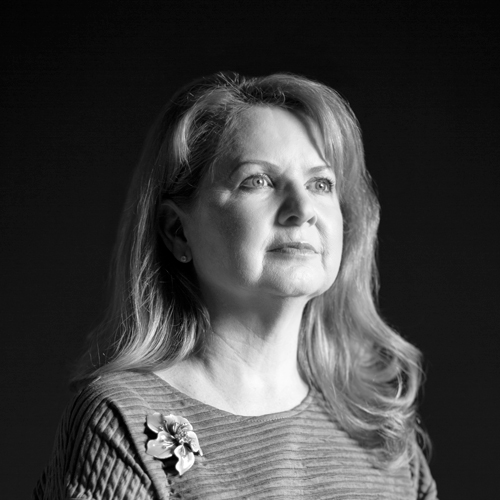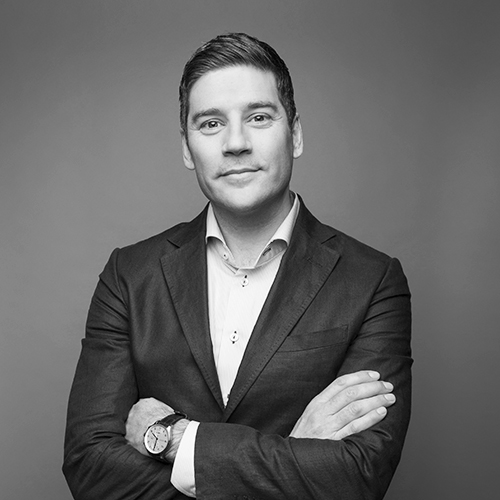Considering her childhood, it’s no surprise Elizabeth Hendler champions legislative efforts to combat sexual harassment and reduce pay gaps. The vice president of legal operations and chief employment counsel at Boston Scientific grew up in Parkway Village, an apartment complex constructed to house United Nations employees during the 1960s in Queens, New York. “It was an era and a place where the way you effected social change was through law,” she recalls.
There, her friends came from Japan, Guyana, and Norway, and her neighbors included feminist icon Betty Friedan and NAACP head Roy Wilkins. Her father, a lawyer, was on the board of the New York Civil Liberties Union, and she often joined him at desegregation meetings.
“Living in a microcosm of different races and cultures—where everyone wore different clothes, ate different foods, spoke different languages—was unusual and formative,” Hendler says. “A lot of people talk about the Civil Rights movement, but if you’re living in an all-white area, it may not resonate. I watched the laws that protected my friends develop in front of my eyes.”
In her high school yearbook, Hendler envisioned her own future as a lawyer and, as it turned out, she now leads a global employment law team that is helping to take corporate responsibility to a new level about three hours north of Parkway Village in Marlborough, Massachusetts.
The $9 billion public company has invented about thirteen thousand life-changing products, such as pacemakers and defibrillators, to help more than twenty-five million patients live longer, healthier lives each year around the world.

“What attracted me to Boston Scientific, in addition to its can-do people and mission, was that I’m an adoptive parent,” Hendler says. “When I was contemplating adoption, I found out Boston Scientific offered paid adoption leave, which was then, and still is, extraordinarily rare.”
Boston Scientific also provided domestic partner benefits before many other companies, Hendler adds, and that inclusive approach continues to differentiate it in the eyes of its workforce. The company displays a rainbow flag at nearly all of its facilities during LGBTQ Pride Month and offers gender-neutral bathrooms for transgender employees. And it also holds a number of veterans flag-raising ceremonies during national holidays.
“For many years, most companies shied away from taking any kind of stance,” Hendler says. “They didn’t see it as their place to comment on what was going on politically and socially outside the core business. But that expectation has changed.”
Hendler is part of the resurgence of inclusion that’s now entering corporate offices, and she’s marked the uptick in companies creating corporate social responsibility departments to manage the newest form of corporate risk: the convergence of politics, societal issues, and social media in the shifting business landscape. “We are in the perfect storm,” she says.
Now employees want to see not only the company’s values, but also its stance on today’s headlines, whether the company responds via external or internal communication, according to Hendler. “Employees want to know what their leadership is thinking about it and more importantly what they are doing about it,” she says.
Hendler’s legal team is on a mission to ensure that Boston Scientific is ahead of that perfect storm. Their focus spans harassment and discrimination investigations, disability leaves and accommodations, compensation practices and pay equity, and restructuring and reductions for more than 29,000 employees in 125 countries across 6 continents.
To tackle these issues, establishing global connectivity is top of mind for Hendler. Last year, her team of lawyers built a global training program that unified localized policies. Her team continues to add scenarios in the global code of conduct set to roll out early this year.
“For many years, most companies shied away from taking any kind of stance. They didn’t see it as their place to comment on what was going on politically and socially outside the core business. But that expectation has changed.”
Hendler also oversees legal operations, which optimizes legal spend and systems for greater visibility among the global legal department. For example, her operations team created a legal onboarding program to announce what legal stands for in an orientation video to set the tone. “We wanted our lawyers to know that we expect them to be the guardians of integrity,” she says.
Evidence of their labors is clear. Glassdoor recently named Boston Scientific on its list of “Awesome Companies With No Gender Pay Gap Hiring Now.” It reported 99 to 100 percent pay equity among men and women of all races. It also earned a score of one hundred on the Human Rights Campaign Corporate Equality Index.
“You have to compare apples to apples and look at the jobs people are doing,” says Hendler, a member of the steering committee for pay equity at Boston Scientific. “That enables you to see if you are truly paying comparable wages for comparable work.”
Her team hired an outside statistician to review pay equity by position, level, and function. They conducted surveys and wrote an open letter to employees, while also creating a social media communications plan for Facebook, Twitter, and LinkedIn.
Hendler also held a Global Pay Equity Summit last March to assemble teams from legal, talent acquisition, and communications in a task force to monitor the ever-changing reporting requirements all over the world.
For example, some US states won’t allow employers to ask prior salary history. And the government of Great Britain required companies to publish their pay data on their websites. To further support its commitment to pay equity, Boston Scientific changed its hiring practices to prohibit the request of salary history from US candidates and is considering similar practices in other countries in accordance with local laws.
But pay equity isn’t the only issue Hendler and her team are leading the charge on. Social media, the catalyst for the #MeToo movement, also provoked a corporate renaissance around workplace sexual harassment—the fervid end of hush money settlements dubbed “the Harvey Weinstein effect” by USA Today.
“People thought companies had sexual harassment under control,” Hendler says. “The problem didn’t go away. The problem went underground. Social media fuels that anger, but I’m seeing more companies proactively using social media to share their commitment to zero tolerance on a massive scale.”
Although most companies have had sexual harassment policies and training for years, Hendler adds, the recent spotlight on sexual harassment expanded corporate attention to arbitration clauses and confidentiality agreements.
Even though Boston Scientific doesn’t use arbitration and implemented a robust sexual harassment policy more than twenty years ago, the company is renewing its zero tolerance stance. Hendler and her team are also working on expanding its harassment training into one, cohesive global program that will be required of all employees and managers.
Looking ahead, Hendler’s team anticipates other changing societal norms. Her team is reassessing its historical drug-test policies based on the legalization of medical marijuana and recreational marijuana in the United States.
“We must remain legally compliant but not rule out a portion of the population we might want to hire,” Hendler says. “We must establish a rationale to answer why or why we’re not drug testing in areas where pot is legal.”
The top-down approach applies to addressing these societal changes, but to be an employer of choice, Boston Scientific develops its internal benefits from the bottom up. “We ask what our employees need to bring their whole selves to work,” Hendler says.
The result: the menu-style Benefits to Fit Your Life program, which offers Boston Scientific employees far more than standard health insurance. It provides pet insurance; the Milk Stork program for breastfeeding mothers on the go; financial assistance education for student loans; sabbatical options every seven years; and childcare subsidies.
Hendler also supports employee resource groups at Boston Scientific. She has served as a mentor in the Women’s Network Program and as a member of the company’s Corporate Citizenship Council, and is currently the sponsor for the East Asian Pacific Employees in Leadership group.
“I get out there and talk to different people who I might not ordinarily see in the course of my day job,” she says. “I like to hear what people are saying, which then helps us to draft policies and programs. You can’t expect other people to be engaged if you are not yourself. Part of leading is jumping in.”
The Next-gen Leaders of Philanthropy
While Elizabeth Hendler expands Boston Scientific’s impact around the world, the legal leader also focuses on improving her own community outside of the office. She volunteers at The Foundation for MetroWest’s Youth in Philanthropy (YIP) program, which has granted more than $1 million to youth-serving nonprofits, from animal shelters to food pantries.
“We give youth teams a pocket of money and they decide which community program gets it and why,” says Hendler, a panelist who evaluates the youth presentations. “It teaches them the concept of giving back and making tough decisions.”
More than 1,250 middle school and high school students have completed the experiential leadership development program since its launch in 1997. Hendler also cites the YIP sponsorship of after-school programs, such as an initiative for students to play basketball and do homework together, and a nature society for inner-city children.
“These kids are unbelievable and the program is so creative,” Hendler says. “It’s the future of philanthropy.”
As a trusted global healthcare legal provider, Baker McKenzie’s strong partnership with Boston Scientific of over 25 years shares a vision of helping to make a meaningful impact on lives around the globe through innovation, solving complex problems and collaborating to navigate a constantly changing and challenging world.


